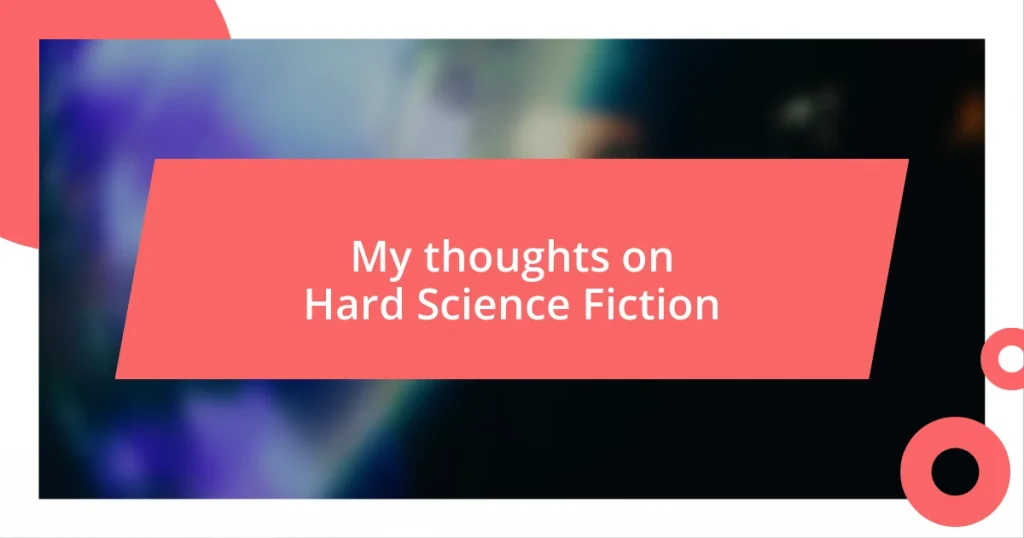Key takeaways:
- Hard science fiction is defined by its adherence to scientific accuracy, inspiring curiosity and exploration of complex scientific concepts.
- It integrates real scientific principles and ethical implications of technology, prompting readers to consider both possibilities and moral dilemmas.
- Character development is central, as protagonists face scientific challenges that make their experiences relatable and impactful to readers.

Understanding Hard Science Fiction
Hard science fiction is grounded in scientific accuracy, pushing the boundaries of what is possible within the laws of physics and our understanding of the universe. I remember picking up Arthur C. Clarke’s “Rendezvous with Rama” and feeling a rush of excitement as I followed along with the precise details of space travel. It’s the type of book that can provoke profound wonder about our place in the cosmos while also making you appreciate the intricacies of real-world science.
One fascinating aspect of hard science fiction is its ability to spark curiosity about scientific fields. When I first read Greg Egan’s “Permutation City,” I found myself diving deep into concepts of consciousness and virtual realities. Have you ever wondered how our technology might evolve? This genre doesn’t just entertain; it inspires its readers to question what we know and to dream about what’s possible tomorrow.
For those of us who appreciate the meticulous rigor of science, hard science fiction feels like a thrilling intellectual challenge. It often paints a realistic picture of the future, serving as a cautionary tale or a hopeful vision. When you can relate to the struggles of characters navigating through plausible scientific problems, it feels incredibly rewarding. Isn’t it amazing how a well-crafted story can make complex scientific ideas not only accessible but also deeply engaging?

Characteristics of Hard Science Fiction
One defining characteristic of hard science fiction is its unwavering commitment to scientific accuracy. When I read works like Kim Stanley Robinson’s “Mars Trilogy,” I was struck by how the author incorporated real scientific principles into the narrative. It made me ponder: How close are we to terraforming another planet, really? This blend of fact and fiction gives readers a sense of plausibility, inviting them to explore scenarios that stretch the imagination yet feel grounded in reality.
Another intriguing feature is the focus on technology and its ethical implications. For instance, when I encountered the concept of nanotechnology in Neal Stephenson’s “The Diamond Age,” it ignited a passion within me to understand how such advancements could reshape society. Have you ever considered the moral dilemmas that arise from such innovations? In hard science fiction, the speculative often forces us to confront not just what we can do, but what we should do.
Lastly, hard science fiction tends to emphasize character development through scientific challenges. I find that when characters wrestle with complex problems—like those in “The Martian” by Andy Weir—they become more relatable. Their triumphs and failures against the backdrop of rigorous science often resonate with us on a personal level. Isn’t it fascinating how these narratives can mirror our own struggles, making the journey all the more impactful?















